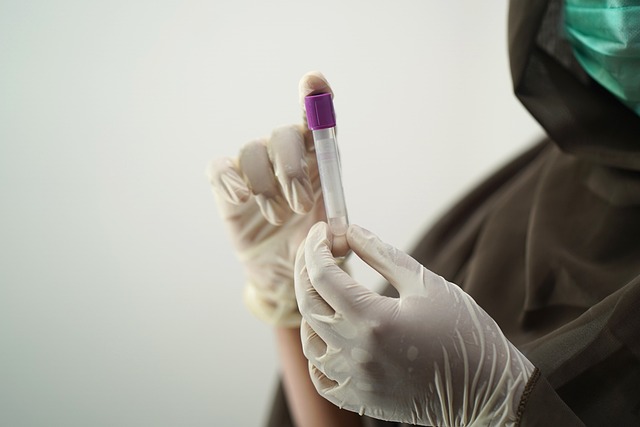The article underscores the critical role of cholesterol in human health and its significance in the context of cardiovascular disease risk, particularly highlighting the importance of maintaining balanced levels to prevent heart attacks, strokes, and other related conditions. In the UK, regular monitoring through the UK Vitamin B12 Blood Test is emphasized as a vital tool for assessing both cholesterol and vitamin B12 levels. This comprehensive test provides detailed lipid profiles, distinguishing between types of cholesterol like HDL ('good') and LDL ('bad') cholesterol, and identifies Vitamin B12 deficiencies which can impact heart health. Early detection through this test enables timely interventions and supports a proactive approach to preventive healthcare, ensuring individuals can make informed decisions about their cardiovascular well-being and overall health. The UK Vitamin B12 Blood Test is an accessible and convenient option for regular monitoring, making it a key component in maintaining heart health and preventing conditions associated with cholesterol imbalances and vitamin deficiencies.
Maintaining optimal cholesterol levels is pivotal for heart health and overall well-being. This article demystifies the process of monitoring cholesterol through simple blood tests, with a special focus on the UK Vitamin B12 Blood Test, a valuable tool in comprehending one’s cardiovascular risk. We delve into the significance of understanding cholesterol types such as LDL and HDL, the impact of diet and exercise, and how to interpret your test results for informed health decisions. Whether you’re seeking initial guidance or aiming to optimize your current management plan, this comprehensive guide provides clear insights into the role of blood tests in keeping your cholesterol in check.
- Understanding Cholesterol and its Impact on Health
- – The Importance of Monitoring Cholesterol Levels
Understanding Cholesterol and its Impact on Health

Cholesterol is a critical lipid component in our bodily systems, primarily found in every cell membrane and essential for the production of vitamin D, hormones, and bile acids. It’s a waxy substance that circulates through our bloodstream, where it plays a pivotal role in maintaining overall health. However, an imbalance in cholesterol levels can lead to plaque buildup within arteries, increasing the risk for cardiovascular diseases such as heart attacks and strokes. In the UK, understanding cholesterol levels is paramount, which is where a Vitamin B12 Blood Test comes into play. This test not only provides insights into the body’s vitamin B12 status, crucial for cognitive function and blood health, but also offers a comprehensive view of lipid profiles, including total cholesterol, HDL (high-density lipoprotein or ‘good’ cholesterol), LDL (low-density lipoprotein or ‘bad’ cholesterol), and triglycerides. Regular monitoring through simple blood tests allows for the timely management of cholesterol levels, reducing the likelihood of cardiovascular complications and supporting general well-being. Individuals can take proactive steps in maintaining heart health by understanding their cholesterol levels through a UK Vitamin B12 Blood Test, a vital tool in the prevention and early detection of conditions linked to cholesterol imbalances.

Regular monitoring of cholesterol levels is a pivotal aspect of maintaining cardiovascular health, and in the UK, individuals can easily ascertain their cholesterol status through a Vitamin B12 Blood Test. This comprehensive test not only assesses total cholesterol but also separates the different types, including LDL (‘bad’) cholesterol and HDL (‘good’) cholesterol, providing a detailed picture of an individual’s lipid profile. Understanding these levels is crucial for early intervention and management of risk factors associated with heart disease and stroke. The UK Vitamin B12 Blood Test is readily accessible through healthcare providers or private clinics, ensuring that individuals can track their cholesterol and Vitamin B12 levels with accuracy and ease. Moreover, early detection of high LDL cholesterol or low HDL cholesterol, in conjunction with assessing Vitamin B12 levels, allows for timely lifestyle modifications or medical treatment to mitigate health risks effectively. Regularly scheduled Vitamin B12 Blood Tests can also be instrumental in identifying deficiencies or imbalances that may affect overall well-being and energy levels, emphasising the importance of this test in preventive healthcare within the UK.
– The Importance of Monitoring Cholesterol Levels

Regular monitoring of cholesterol levels is a pivotal aspect of maintaining cardiovascular health, as high levels of cholesterol can significantly increase the risk of heart disease and stroke. In the UK, Vitamin B12 Blood Tests are readily available, offering individuals a straightforward method to assess their overall heart health. These tests measure the key lipid components in the bloodstream, including LDL (low-density lipoprotein), often referred to as “bad” cholesterol, and HDL (high-density lipoprotein), known as “good” cholesterol. By identifying imbalances early on, individuals can take proactive steps to adjust their lifestyle or medication regimen, thereby reducing their chances of developing cardiovascular problems. Additionally, the UK Vitamin B12 Blood Test is particularly relevant as vitamin B12 deficiency can also affect cholesterol metabolism and heart health, making it a comprehensive health indicator. This test not only provides insight into cholesterol levels but also offers a broader view of one’s health status, enabling informed decisions for maintaining long-term well-being.
Regular monitoring of cholesterol levels is a key aspect of maintaining cardiovascular health, as detailed in this article. Simple blood tests, easily accessible across the UK, can provide valuable insights into an individual’s lipid profile. For those concerned about their cholesterol or vitamin B12 levels—a concern that has become increasingly prominent with the awareness of the UK Vitamin B12 Blood Test—such tests offer a non-invasive means to assess overall wellbeing. By understanding the components of cholesterol and its impact on health, individuals can take proactive steps towards prevention and management of risk factors associated with heart disease. It is advisable to consult healthcare professionals for personalized medical advice and to interpret test results accurately. With these tools at hand, one can make informed decisions about their diet and lifestyle, paving the way for a healthier future.
